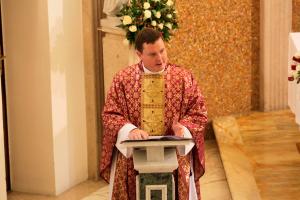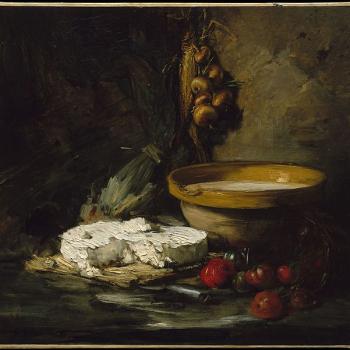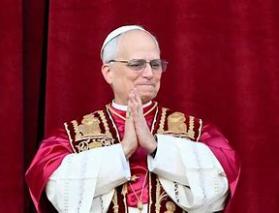For those who are attached to the Extraordinary Form, I can understand why. It was crafted in an organic way over thousands of years, it is rich with symbolism, and it has an aura of sacredness that can seem difficult to carry over to the Ordinary Form. (More about that below.)
I think I speak for a lot of Catholics that, unfortunately, it is not uncommon for the Ordinary Form to be celebrated in a sloppy, informal, or otherwise irreverent way. The sheer number of variations possible can be daunting (and for the celebrating priest, often bewildering). It is not uncommon for the quality of the sacred music to be sub-par, and the sacred silence that is recommended before and after the celebration is often disregarded. More often than not, the liturgical vestments are distracting and seem to be of cheap construction.
I should point out, however, none of this, as such, is actually a defect in the rite itself, but rather in its execution. The Ordinary Form should always be understood and executed in continuity with the Extraordinary from which it came, and if this were done faithfully, I think a lot of the concerns of those attached to the Extraordinary Form would be relieved. (It is worth noting that the Extraordinary Form could be celebrated in a sloppy way, too: for instance, it was not uncommon in the so-called “low Mass”—a Mass that was celebrated for an ordinary week day—for the priest to rush through it, even though he accomplished all the rubrics.)
I think a case can be made that some of the details in the post-conciliar reforms made to the Mass are questionable, both in their purpose and in the way they were brought about. There was an effort to “simplify” the Mass and to bring it closer to its “original” expression—but in the reformers’ zeal to accomplish this goal, perhaps some of the rich symbolism of the Extraordinary Form was eroded. However, I can point to numerous examples in which the Ordinary Form is celebrated with dignity and great beauty.
On the other hand, I can understand the concerns raised by the Holy Father as well.
The Trap
Unfortunately, it is not difficult to fall into the trap of identifying abuses in the sacred liturgy with the Ordinary Form itself, and from there it is not difficult to call into question the reform itself, and from there the ecumenical council, the Second Vatican Council, that began the process of reform.
That trap, however, is a very dangerous and unfortunate one to fall into, especially the rejection of Vatican II. I would encourage anyone who has read this far in my post to read as many of the Council documents as possible. They are a veritable treasure trove of truth and doctrine, especially the four principle “constitutions”: Sacrosanctum concilium (on the sacred liturgy), Dei Verbum (on the Scriptures), Lumen gentium (on the Church), and Gaudium et spes (on the relationship of the Church to the modern world).
It is, therefore, most distressing to see that a lot of people and groups attached to the Extraordinary Form end up attacking an ecumenical council that, in fact, faithfully exposes and expands on the Church’s teaching. Even more distressing is to see groups calling into question the validity of the rites promulgated after the reform, as if it were possible for the Church to approve a liturgy incompatible with the celebration of the Sacraments. Such would give lie to our Lord’s solemn promise to Peter that nothing, not even the “gates of Hell” would overcome the Church (Matthew 16:18). It is not uncommon for this kind of criticism to involve the Holy Father himself, as if he were being unfaithful.
Equally distressing, however, is the attitude of other people and groups—most of them decidedly not attached to the Extraordinary Form—who minimize or dismiss the legitimate concerns, and genuine needs, of those who love the Extraordinary form.
Neither tendency is healthy for the Church, and I can at least understand where the Holy Father is coming from, because it seems that these tendencies have been increasing, and the criticisms have become more vocal and shrill over time.
So, what do I think of the Holy Father’s decision?
What I Think of the Pope’s Decision
Let me begin by saying that I fully support the Holy Father. I intend to obey him, and have no intention to be disloyal in any way whatsoever. I shouldn’t have to say this, but he is not a heretic, and whatever I think of his prudential decisions, he has faithfully led the Church in his time as Pope.
If, however, I had to give the Holy Father some constructive advice regarding this particular apostolic letter, it would be as follows.
First of all, I fear that the sudden rescinding of the permissions to celebrate the Extraordinary Form will salt the wounds in those who are attached to that form, and they will feel much more marginalized than they were during the time of Summorum Pontificum. That, in turn, will drive many to schismatic or irregular groups, such as the SSPX—which I think is contrary to the Holy Father’s intentions.
Second, it represents a considerable centralization and consolidation of power over the celebration of the liturgy to the Holy See. For example, newly ordained priests who would like to celebrate in the
Extraordinary Form must now request permission from their bishop, and he, in turn must first consult the Holy See before granting it. How much control the Holy See should have is a matter for prudential
judgment, but this is a very sharp contrast to other reforms that Francis has made (for instance, in giving each region practically complete autonomy in the translation of liturgical books). I think, on the whole, it is best for the Church leave things to people’s free choice, and not be in the business of placing obstacles in the way of their legitimate liturgical preferences.
Third, although the results of the consultation made to the bishops have not been made public (in my opinion, some sort of summary, keeping the names of individual bishop anonymous, should be made available), I am not sure that they have correctly identified the causes of the divisions regarding the Extraordinary Form. Traditiones custodes seems to attribute it almost exclusively to Benedict’s “liberalization” of the celebration of the Extraordinary Form. In reality, I think that the dominant root cause is something else: I think that many people perceive that the Church in Francis’ era is becoming (for lack of a better expression) more “liberal” (i.e., less faithful in some regards to the Church’s constant teachings), and many of those those attached to the Extraordinary Form feel threatened. As I have said, I think that many of these concerns are unfounded or at least exaggerated, but it would be a good idea for the Holy Father and other bishops to address them with charity and also clarity.
Finally, the Holy Father does not address the question of the problems we encounter with the celebration of the Ordinary Form, that I mentioned above. He does not have to do so in this motu proprio, but if he would like to give an olive branch to those who are attached to the Extraordinary Form, it would not be a bad idea to address some of those abuses later on.
I stress that I make these reflections in the hope that they are constructive and not because I have anything against the Holy Father. (Unfortunately, unreasonable criticisms do abound, especially on social media.) It is, at the end of the day, a prudential decision, and it is our duty as members of the Church to be on board with what the Holy Father disposes.
I certainly hope and pray that he will succeed in his goal: that is, the healing of divisions in the Church. That, in the end, is the most important thing.














